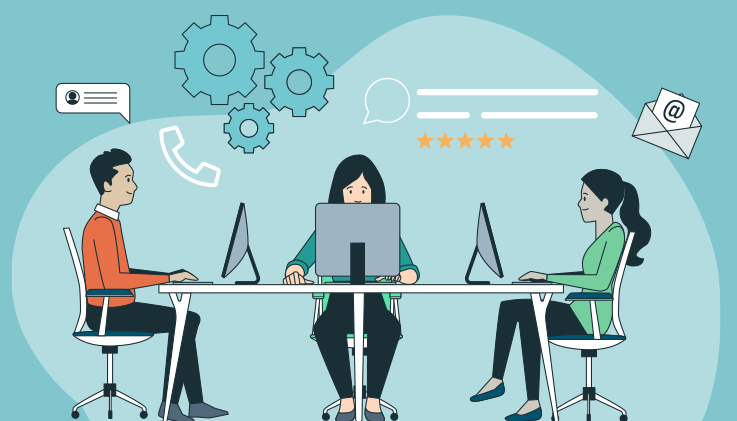A brand's customer service quality is a crucial differentiator in today's competitive market. As consumers become more discerning, how will you ensure their helpline and support experiences transform from frustration to fantastic? The answer lies in implementing customer service software solutions enhanced with AI and automation.
But with countless options available, choosing the right customer service software can feel overwhelming. While many platforms offer standard features, the real game-changer lies in finding one with the X factor—those advanced capabilities that truly set it apart. Let’s explore the key considerations that will guide you toward the software with that critical edge.
6 factors to consider for smarter software decisions
In today's competitive landscape, businesses must prioritize customer satisfaction to maintain their market position. Here are a few ideas that will help organizations select the perfect service desk software for their customer service, ultimately assisting them to meet and exceed customer expectations:
Inbuilt Artificial Intelligence: Software lacking AI capabilities cannot withstand the test of time. During your evaluation of these capabilities, consider features such as natural language processing, machine learning algorithms, conversation bots, sentiment analysis, and predictive analytics. Advanced AI tools adapt and learn from user interactions, enhancing efficiency and increasing satisfaction. Implementing customer service tools equipped with essential AI capabilities helps automate tasks, streamline processes, enhance decision-making, and improve user interactions.
Data Analytics: Analytics and reports deliver critical insights into customer behavior, enabling enterprises to proactively anticipate and meet customer needs. It's crucial to evaluate the data visualization features and reporting capabilities of the software. Neglecting to leverage advanced analytics can result in missed opportunities to understand customer behavior and assess service performance. Identifying trends, measuring effectiveness, and guiding informed decision-making are essential. Insights from touchpoints, surveys, and product feedback illuminate the customer journey, offering valuable perspectives. Additionally, analyzing data on past consumer inconveniences empowers brands to address issues before it’s too late and customers reach the point of no return.
Third-Party Software Integration: Prioritize customer service tools with strong integration features for a seamless experience. Assess integration capabilities by checking for compatibility with popular APIs, data import/export options, and existing systems like CRM, ERP, or project management tools. The ability to integrate with third-party applications significantly extends the functionality of your software and streamlines operations. Without these integration features, data silos may form, reducing the efficiency of your customer support teams' workflows.
Platform Scalability: Scalability refers to a software's capacity to grow and adapt to changing business needs. Consider whether the software can easily accommodate additional users, modules, or services during your evaluation of scalability. Look for cloud-based solutions, which often provide greater flexibility in scaling compared to on-premises software. Scalable customer service software helps prevent costly migrations in the future. Additionally, your chosen software must be equipped with the latest technologies to avoid becoming a legacy platform and to accommodate future growth in users, features, and service ticket volumes.
User/Agent Experience: User experience (UX) focuses on how users interact with the software and the overall satisfaction derived from it. Ignoring the quality of user experience can lead to frustration among support teams and customers. A positive UX is critical for user adoption and productivity. While evaluating software, consider its design, ease of navigation, responsiveness, and accessibility. Look for features like customizable dashboards, intuitive interfaces, and user support resources. A software solution that prioritizes UX will lead to higher user engagement, reduced training time, and, ultimately, better outcomes for your organization.
Security and Compliance: Security and compliance are paramount in today's digital landscape, where data breaches and regulatory requirements are common concerns. The service desk software must adhere to data protection and security guidelines enforced by government and law enforcement agencies. As you assess software, evaluate its security features, such as encryption, user authentication, and data protection measures. Ensure that the software complies with relevant industry standards and regulations, such as GDPR or HIPAA. The software solution must protect customer data and provide the peace of mind necessary for customers to conduct business with your organization.
In summary, considering these factors — AI capabilities, third-party software integration, scalability, data analytics, user experience, and security and compliance—will enable organizations to make informed and strategic software decisions that align with their goals and operational needs. The tips mentioned will help you select and implement your business's most appropriate customer service software.
Every business needs customer service software
AI-powered customer service software provides significant advantages across various industries, including retail, hospitality, healthcare, IT services, education, finance, e-commerce, logistics, and telecommunications. Businesses choose customer service software for the following reasons:
- Increase customer satisfaction through faster and more accurate issue resolution.
- Improve agent efficiency with AI-based productivity tools and by reducing manual tasks and eliminating redundancies.
- Optimize the customer journey by comprehensively viewing customer interactions across multiple channels.
- Strengthen brand-customer relationships by delivering exceptional service and support experiences.
ThinkOwl is transforming support with innovative solutions. OwlDesk and OwlForce, customer support solutions from ThinkOwl, help entrepreneurs automate business processes, streamline tasks, communicate across multiple channels, enhance the experiences of both customers and support agents, monitor customer journeys with unparalleled insight, boost team productivity, scale customer service operations, and support business growth.
With ThinkOwl, you can outpace your competition and impress customers with exceptional experiences. It’s time to level up your service game with ThinkOwl. Sign up now for a 30-day free trial.
